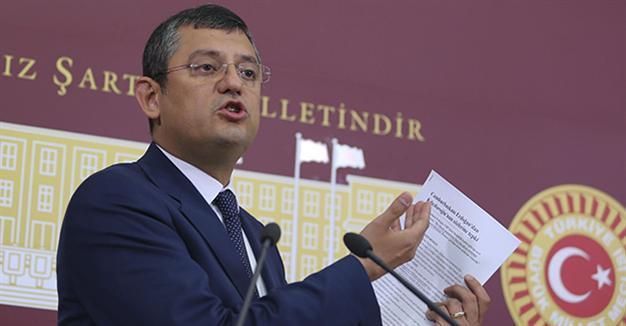CHP alarmed at parliamentary speaker’s failure to use Atatürk maxim
ANKARA

Turkey’s main opposition Republican People’s Party (CHP) has been left infuriated after an invitation from the parliamentary speaker to an event at the legislature failed to include a maxim by Turkey’s founder that is customarily printed as a sign of the institutional identity of the parliament.
The logo of the Grand National Assembly of Turkey (TBMM) was printed without the maxim “Sovereignty belongs unconditionally to the nation” by Mustafa Kemal Atatürk in an invitation sent out by Parliamentary Speaker İsmail Kahraman to members of the parliament for an iftar dinner set for June 15.
A deputy parliamentary group chair of the CHP, Özgür Özel, filed a parliamentary question to Kahraman on June 13 and demanded to know why the customary use of the logo known as “the TBMM Yaldızlı Eskiz” (TBMM Gilded Sketch) had not been included on the invitation.
Özel asked Kahraman whether the removal of the maxim “Sovereignty belongs unconditionally to the nation,” was a design or print mistake.
“If there is a design or print mistake, then why weren’t the invitations recollected? Which unit is in charge of the design and final check before the invitations that belong to the TBMM Parliament Speaker’s Office are sent out?” Özel asked.
“Who is the responsible for this incident, which is a grave error that has been directed at the institutional identity of the TBMM? Have you launched any investigation on this subject? What is the reason behind using the sketch in a way that is contradictory to the institutional identity if there weren’t any mistakes in design or printing?” he asked.
“If the invitations had been deliberately printed like this, did the meaning of ‘Sovereignty belongs unconditionally to the nation,’ annoy you as the TBMM speaker?” Özel asked.
Later on June 13, another deputy parliamentary group chair of the CHP, Engin Altay, was asked about the controversy while speaking with reporters.
That maxim by Atatürk embroidered on every logo that symbolizes the parliament of the Republic of Turkey is included on every document of the parliament, Altay said.
Kahraman has an issue with the principle of secularity, Altay said. “I suspect someone who has a problem with laicism of Islamism.”
“This attitude is the attitude of Derviş Mehmet, albeit while wearing a necktie,” Altay said, in a reference to the killing of Lt. Mustafa Fehim Kubilay in December 1930 in what is known as the Kubilay case or the Menemen Incident.
“This attitude is an attitude of Derviş Mehmet with a necktie. It is a … mistake that someone who has problem with laicism … can become the Parliamentary Speaker. Mr. Kahraman has so far made no statement about this subject. Mr. Kahraman and everybody should know that Republic exists everywhere. There is no way that the laicism trait of the Republic of Turkey can change,” Altay said.
The Menemen Incident began with a raid on Derviş Mehmet and his followers in Menemen, İzmir, on Dec. 23, 1930. Mehmet, who claimed he was “mehdi,” incited people to riot against the republic by saying the army of the caliphate, which had been abolished by parliament, would join them soon. Kubilay resisted Mehmet, prompting the dervish’s followers to shoot and kill the lieutenant. Mehmet and his followers then severed Kubilay’s head and stuck it on a pole before touring the streets of Menemen. The riot was quashed by soldiers, and Mehmet and his closest men were killed. After the riot, the murder of Kubilay was remembered as a symbol of fighting fundamentalism.
 Turkey’s main opposition Republican People’s Party (CHP) has been left infuriated after an invitation from the parliamentary speaker to an event at the legislature failed to include a maxim by Turkey’s founder that is customarily printed as a sign of the institutional identity of the parliament.
Turkey’s main opposition Republican People’s Party (CHP) has been left infuriated after an invitation from the parliamentary speaker to an event at the legislature failed to include a maxim by Turkey’s founder that is customarily printed as a sign of the institutional identity of the parliament.